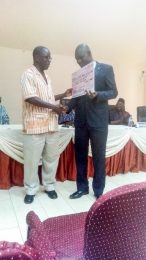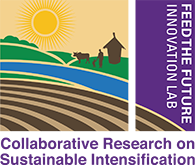
The Appropriate Scale Mechanization Innovation Hub-Burkina Faso recently received a nationally competitive grant to accelerate the process of scaling up the maize planter that was built and demonstrated at the Appropriate Scale Mechanization Field Hub in 2017. The submitted proposal, Mechanized Sowing of Maize with an Animal-Drawn Planter, was the top submission among 55 proposals received by the National Fund for Research and Innovation for Development (FONRID) in Burkina Faso. The proposal was in response to a call by FONRID for innovations poised to advance “Sustainable Intensification of Agro-Forestry and Pastoral Production.” After rigorous review by the Council of Science and Technology, it was concluded that the planter technology responds to an urgent need of smallholder farmers in their quest for national food security. The team received a grant of $18,666 that will supplement and accelerate the efforts to scale-up production and use of the planter (Fig. 1). FONRID’s support reaffirms that the Appropriate Scale Mechanization Consortium (ASMC) project is addressing an urgent agricultural need for smallholder farmers.
Burkinabé farmers face many challenges. The level of on-farm mechanization is low. Seventy percent of smallholder farmers rely on hand labor. Less than 30% use draft animal power and less than 1% use engine power.

Women and children carry the burden of the most tedious work (Fig. 2). The cropping systems have failed to sustain natural soil fertility and productivity. Farmers lack easy access to improved and affordable seed and essential crop care inputs. Water is scarce and rainfall is increasingly unpredictable. After 25 years of neglecting mechanization research, there is a lack of appropriate and affordable tools for animal traction and conservation agriculture.
The overarching goal of our work in Burkina Faso is to assist smallholder farmers to improve their quality of life by integrating appropriate technologies in existing crop and livestock systems that sustain profitability and boost ecosystem resilience by alleviating labor bottlenecks while reducing the drudgery of labor-intensive farm tasks. We are improving the application of animal power by improving animal comfort and training the animals to be more responsive and cooperative in the yoke. Our Field Hub is on the farm of a local leading farmer. We are working with him on a process of adaptive management to develop and evaluate a diverse set of technologies with varying levels of complexity in sync with local economic, social and environmental conditions. Here is a short video of our work in developing and testing the planter and other tools in 2017: Conservation tillage, planting and cultivation in Burkina Faso
The successful planter development is just one aspect our work. Based on our results so far:
- Farmers are adopting low-stress training techniques for oxen and transitioning to new yokes that are built from locally available materials and designed for animal comfort.
- We have improved the capacity of local blacksmiths to design, build, evaluate and repair row-crop, plate-type planters to reduce the drudgery of hand planting for women and children.
- Based on local fabrication and material costs, we have reduced the cost of locally built planters by more than 50% with an innovative seed-plate drive mechanism while improving seed spacing uniformity and emergence.
- We are reducing labor bottlenecks and improving productivity and profitability by demonstrating implements and production systems on the two-hectare, Ly Farm demonstration site.
- Based on on-farm measurements, we have increased the effective root cutting width of locally built row crop cultivators by 20% while reducing cultivator draft (the pulling force required by the oxen) by 21% with innovative low-crown, low pitch-angle cultivator sweeps while improving cultivator stability, operator comfort and weed control.
Our efforts over the coming year will integrate the planter in the cropping systems in the Haut-Bassins region and beyond by training artisans and building capacity in mechanical fabrication and maintenance, in regional farmer-to-farmer field schools, and in regional on-farm demonstration and training programs. The adoption of the planter in the context of conservation agriculture will mitigate food insecurity and alleviate the drudgery of hand planting corn and other row-crops, build soil health and protect water quality. Our goal is to reach 1000 farmers in the next 12 months
This award is the result of a fruitful working relationship among the ASMC partners, Tillers International, and faculty and students at the Institute for Rural Development at University Nazi Boni (formally Université Polytechnique de Bobo-Dioulasso) in Bobo-Dioulasso. Congratulations to the proposal team for preparing an excellent proposal, especially Dr. Vinsoun Millogo and UNB student Sayaogo Boureima!
Written by:
Dr. Tim Harrigan, Associate Professor, Biosystems and Agricultural Engineering, Michigan State University; Dr. Vinsoun Millogo, Assistant Professor, Université Nazi Boni, Bobo-Dioulasso; Mr. Sayaogo Boureima, student, Institute of Rural Development, Université Nazi Boni.


